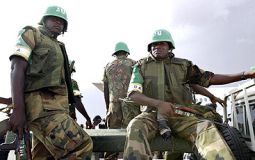AU to assess lack of cash, equipment for Darfur
Dec 4, 2005 (ABUJA) — The African Union is sending a team to Darfur next week to assess funding and equipment shortages hindering the ability of AU troops to bring order to Sudan’s lawless west, the mission’s military chief said on Sunday.
 About 6,000 AU troops and police are trying to stop escalating violence in Darfur but those in charge say they lack the vehicles and communications equipment needed to operate effectively in the desert region the size of France.
About 6,000 AU troops and police are trying to stop escalating violence in Darfur but those in charge say they lack the vehicles and communications equipment needed to operate effectively in the desert region the size of France.
“If you are supposed to move people with 20 vehicles and you are moving them with six vehicles, you can understand the problems,” said Festus Okonkwo, the military head of the AU mission, in Nigeria where Darfur peace talks are taking place.
“It’s affecting everything,” he told Reuters.
Violations of a ceasefire have intensified in Darfur over the past two months and U.N. Secretary-General Kofi Annan has warned the region risked a descent into lawlessness and anarchy.
Okonkwo, a Nigerian, said he hoped a 10-day assessment mission starting Dec. 10 would address some of the AU’s problems and decide whether more troops were needed. There are 5,618 AU soldiers and observers on the ground, he said.
The figure falls short of the 6,171-strong force that were supposed to have been deployed by the end of September as member nations have not been able to muster all the troops needed.
Most of the troops so far have come from Nigeria, Rwanda, Senegal, South Africa and Ghana.
Tens of thousands have been killed and more than 2 million forced from their homes in the Darfur violence, which the United States has labelled genocide.
Okonkwo said 105 armoured personnel carriers (APCs) that rolled into Darfur last month would make the AU more effective.
“That is going to improve the capacity of the troops on the ground because if we have to be able to protect civilians, we need to be protected ourselves,” he said.
AU TROOPS TARGETED
AU forces have been targeted by combatants in Darfur and suffered their first casualties in October when four soldiers were killed in an ambush.
As the latest round of peace talks in the Nigerian capital Abuja opened, a breakaway rebel faction attacked and injured five AU soldiers.
During a recent Arab militia raid on Tama village in South Darfur, AU troops initially refused to enter the village saying they were too scared, witnesses said.
“We are like sitting ducks here,” said one soldier, who declined to be named.
Rebels cite this weakness for their refusal to relinquish control of some towns in South Darfur to the AU.
“Even right now in Marla (town) the government is attacking civilians in front of the AU,” rebel Sudan Liberation Army (SLA) spokesman Esam Elhag said.
And there are concerns about funding. Unlike U.N. peacekeeping missions, pre-budgeted by the world body, the AU relies on the whim of donor nations, which pledged $300 million in May.
In November, the U.S. Congress voted to cut $50 million for the AU’s Darfur mission.
“It is not the tightest of ways to mount a mission when you do not have full control of all the resources required,” the AU’s special envoy for Sudan Baba Gana Kingibe said.
While U.S. Deputy Secretary of State Robert Zoellick said cash would be allocated from other areas to meet the $50 million shortfall, troops in Darfur say they are wondering if their salaries will be paid next week.
The AU is working on less than a third of the annual budget of a U.N. peacekeeping mission being deployed to Sudan’s south to preserve a peace deal signed in January to end a separate southern civil war which raged for more than two decades.
(Reuters)
